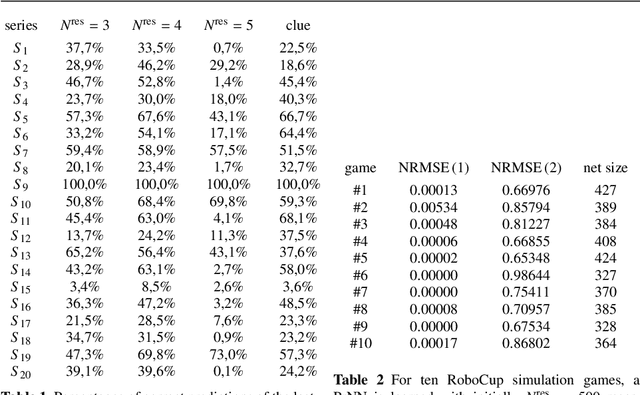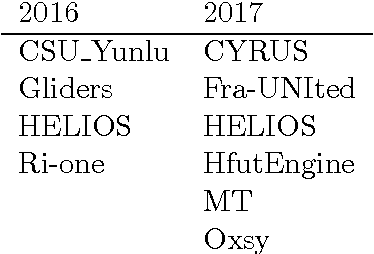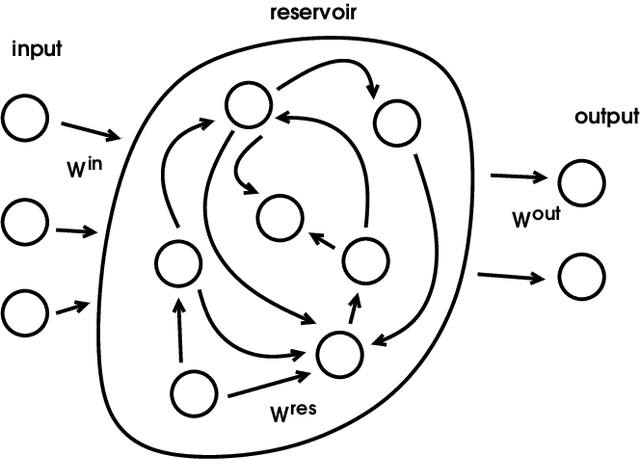Olivia Michael
Predictive Neural Networks
May 02, 2018



Abstract:Recurrent neural networks are a powerful means to cope with time series. We show that already linearly activated recurrent neural networks can approximate any time-dependent function f(t) given by a number of function values. The approximation can effectively be learned by simply solving a linear equation system; no backpropagation or similar methods are needed. Furthermore, the network size can be reduced by taking only the most relevant components of the network. Thus, in contrast to others, our approach not only learns network weights but also the network architecture. The networks have interesting properties: In the stationary case they end up in ellipse trajectories in the long run, and they allow the prediction of further values and compact representations of functions. We demonstrate this by several experiments, among them multiple superimposed oscillators (MSO) and robotic soccer. Predictive neural networks outperform the previous state-of-the-art for the MSO task with a minimal number of units.
RoboCupSimData: A RoboCup soccer research dataset
Nov 06, 2017

Abstract:RoboCup is an international scientific robot competition in which teams of multiple robots compete against each other. Its different leagues provide many sources of robotics data, that can be used for further analysis and application of machine learning. This paper describes a large dataset from games of some of the top teams (from 2016 and 2017) in RoboCup Soccer Simulation League (2D), where teams of 11 robots (agents) compete against each other. Overall, we used 10 different teams to play each other, resulting in 45 unique pairings. For each pairing, we ran 25 matches (of 10mins), leading to 1125 matches or more than 180 hours of game play. The generated CSV files are 17GB of data (zipped), or 229GB (unzipped). The dataset is unique in the sense that it contains both the ground truth data (global, complete, noise-free information of all objects on the field), as well as the noisy, local and incomplete percepts of each robot. These data are made available as CSV files, as well as in the original soccer simulator formats.
Analysing Soccer Games with Clustering and Conceptors
Aug 19, 2017



Abstract:We present a new approach for identifying situations and behaviours, which we call "moves", from soccer games in the 2D simulation league. Being able to identify key situations and behaviours are useful capabilities for analysing soccer matches, anticipating opponent behaviours to aid selection of appropriate tactics, and also as a prerequisite for automatic learning of behaviours and policies. To support a wide set of strategies, our goal is to identify situations from data, in an unsupervised way without making use of pre-defined soccer specific concepts such as "pass" or "dribble". The recurrent neural networks we use in our approach act as a high-dimensional projection of the recent history of a situation on the field. Similar situations, i.e., with similar histories, are found by clustering of network states. The same networks are also used to learn so-called conceptors, that are lower-dimensional manifolds that describe trajectories through a high-dimensional state space that enable situation-specific predictions from the same neural network. With the proposed approach, we can segment games into sequences of situations that are learnt in an unsupervised way, and learn conceptors that are useful for the prediction of the near future of the respective situation.
* To appear in RoboCup 2017: Robot World Cup XXI; Springer, 2018
BetaRun Soccer Simulation League Team: Variety, Complexity, and Learning
Aug 19, 2017Abstract:RoboCup offers a set of benchmark problems for Artificial Intelligence in form of official world championships since 1997. The most tactical advanced and richest in terms of behavioural complexity of these is the 2D Soccer Simulation League, a simulated robotic soccer competition. BetaRun is a new attempt combining both machine learning and manual programming approaches, with the ultimate goal to arrive at a team that is trained entirely from observing and playing games, and a new development based on agent2D.
 Add to Chrome
Add to Chrome Add to Firefox
Add to Firefox Add to Edge
Add to Edge